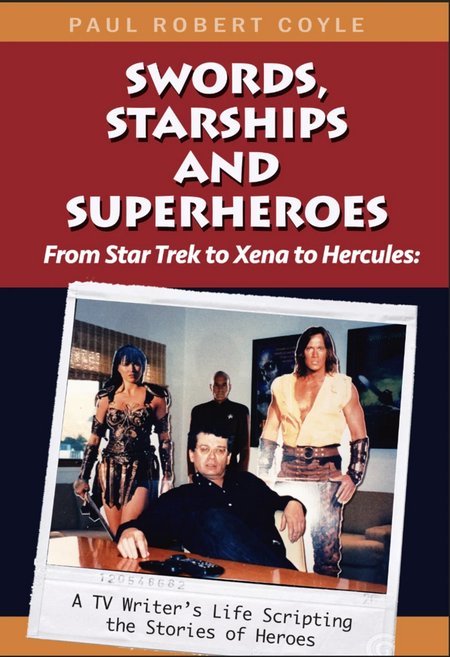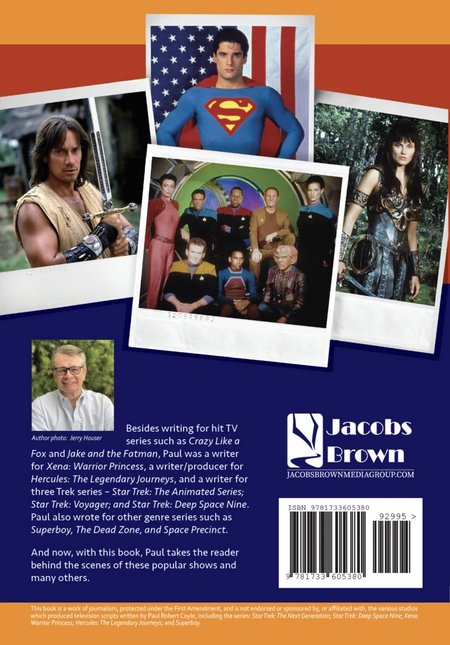Paul Robert Coyle has a new book called WORDS, STARSHIPS AND SUPERHEROES: From Star Trek to Xena to Hercules, A TV Writer’s Life Scripting the Stories of Heroes by Paul Robert Coyle
Purchase from (kindle / print)
https://www.amazon.com/dp/B08M953MG2
or direct from the publisher
https://jbmj-book-store.myshopify.com/products/swords-starships-and-superheros
Besides writing for hit TV series such as Crazy Like a Fox and Jake and the Fatman, Paul was a writer for Xena: Warrior Princess, a writer/producer for Hercules: The Legendary Journeys, and a writer for three Trek series ? Star Trek: The Animated Series; Star Trek: Voyager; and Star Trek: Deep Space Nine. Paul also wrote for other genre series such as Superboy, The Dead Zone, and Space Precinct. And now, with this book, Paul takes the reader behind the scenes of these popular shows and many others.
Excerpts
My first pitch meeting at XENA
The Xena offices were in a bungalow-like building in Studio City, a mile or so off the Universal lot. (Today a row of condos occupies the block.) At my meeting, all the big guns turned out. The Xena writing staff consisted of three people. There was R.J. Stewart, showrunner … Steven L. Sears, Supervising Producer … and Chris Manheim, Story Editor. (I recognized Chris’s name from Murder, She Wrote and other credits. I’d naively assumed it was a guy. She isn’t.) Also there, crammed into R.J.’s office for my pitch, were Executive Producer Rob Tapert, and Liz Friedman, Producer. Oh, and Alex Kurtzman, whose title was something like Creative Associate.
It was overwhelming. I expected to be meeting with R.J., maybe one other staffer. Everyone who had anything to do with the show creatively was there! Were they expecting Aaron Sorkin? Did they gangbang every freelance pitch? Well, I figured if they hated my stories and I wasted everyone’s time, at least they could have a production meeting after I’d gone. Or a séance.
Actually, nobody was the least bit intimidating. They were all friendly, in fact. I’ll spare the details of the stories I pitched, because I mostly don’t remember them. I blacked out and went into auto-drive mode. And after all that research into Greek mythology, the one they liked was – “How about a version of Agatha Christie? Xena’s swept up in a deathmatch among warlords. They’re trapped in some Gothic castle, killing themselves off one by one.”
A wave of enthusiasm seemed to sweep the room. (Which beats a wave of nausea any day.)
And just like that, I was a Xena writer.
On writing Xena
I had an idea for a scene. “Why does Callisto go along with Xena’s proposal? I know, it’s so she can get her hands on the ambrosia. But that’s just the MacGuffin. It’s just plot. Why does she really do it? I mean, emotionally?”
I already had the idea. This was in line with one of my personal rules: Don’t criticize something – a plot point, a line of dialogue – in your script, or especially in someone else’s – unless you have a “fix.” (That’s the best tip I always pass along to writing students.) I pitched mine …
“What if Callisto says, I’ll help you on one condition. There’s something I want you to do first, Xena.”
Her plan is to put Xena through an emotional hell. Xena’s backstory was that she was a badass warrior; her army wiped out Callisto’s village of Cirra. Young Callisto saw her parents slaughtered in front of her eyes. Xena’s thing now is to atone for her past, but she’s never made a public mea culpa. “That’s what Callisto demands of her now,” I said. “Stop in a public square, and make a confession. For the world to hear.”
A simple scene. It wouldn’t take long, and it wouldn’t detract from the mission to lure Velasca to a box canyon, where Xena planned a trap. But this set off a shitload of objections from Liz Friedman. Liz was a fierce protector of Xena’s character, of her mantle as The Hero. There were unwritten rules I wasn’t aware of.
Xena can’t be tricked.
Xena can’t be made to do something she doesn’t want to do.
If Xena makes this speech, it has to happen in such a way that Callisto gains no satisfaction from it.
And on and on and on. Liz was stubborn, she was passionate. And she was right. I put the scene in, and somehow made it work for her.
On meeting Lucy Lawless
One day at the Renaissance office, I met Lucy Lawless for the first time. This was months after her injury; she’d resumed filming, and was back on a break. What a surprise, finding Lucy – at that point one of the most famous faces in the world – just hanging out. Of course, she was there because she was dating Rob. She seemed a little tired that day, and I think she was comfortable being in the Renaissance offices because nobody made a fuss over her. We were introduced, but it wasn’t until subsequent meetings, including on the Xena set in New Zealand, that I got to have a few longer chats with her. Lucy was always charming and approachable, a “real person.” Luckily, even though I was on staff at Hercules, I wasn’t done writing for Lucy. I handled all her crossover guest shots on Hercules, and later wrote several more Xenas.
On dealing with fans
After the Xena season finale aired in May 1998, I spent that summer hiding from the fan community. I was sitting on a big secret – that Renee/Gabrielle would be back, after all. I skipped speaking at conventions. I could’ve stuck with, “My lips are sealed,” but I was afraid of spilling something inadvertently. Better to avoid the spotlight.
There has been controversy in the fan community for years over the death of Callisto. That is, in Xena’s killing of Callisto. The setup was, Callisto wants to die. More specifically, she wants oblivion. She makes a deal with Xena – in return for her help defeating Dahak and Ares, she wants Xena to use the Hind’s-blood dagger – the only thing that can kill a god (remember, Callisto achieved godhood when she ate ambrosia) – to kill Callisto. Xena agrees.
Then, when Callisto witnesses Gabrielle’s unexpected plunge into the lava pit, she (Callisto) is overjoyed. She decides she wants her life back after all. “It finally makes life worth living again! And I have YOU TO THANK, XENA!!”
Xena thrusts the knife into her heart, with a simple “No more living for you.”
Of all the questions from fans I’ve ever gotten, this may be the biggest. “Callisto said that to trick Xena, right? To trick her into using the Hind’s-blood dagger to kill her?” It’s often a statement, not a question. Hudson Leick, Callisto herself, subscribes to this theory, saying as much on her commentary track to “Sacrifice 2” on the Anchor Bay Season III DVD release. “But I understand if I had to pretend,” Hudson says on the audio track, “so I can get Xena to actually obliterate me.” (As the actress playing Callisto, she understandably needed to see Callisto as the prime mover in the scene.)
Once and for all, everybody, the author’s answer is: No, Xena wasn’t “tricked.” Callisto didn’t manipulate her. (Sorry, Hudson.) In that moment, Callisto really did want to go on living. But Xena gave Callisto the thing she’d promised her in the first place: death.
No need to overthink it. Sometimes a thing is just a thing.

